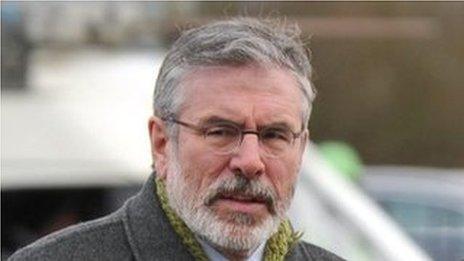Where do we go from here?
- Published
- comments

Speaking after his release on Sunday evening, Mr Adams claimed there was a 'sustained, malicious, untruthful campaign' against him
He's a keen amateur cook, so Gerry Adams' complaints about the cuisine at Antrim police station are in character. When he faced charges for IRA membership in the late 1970s (a case thrown out due to insufficient evidence), Mr Adams was moved between Crumlin Road jail and the Maze or Long Kesh prison.
He noted then that: "The only thing I liked about the Crum was that the grub was far superior to that at the Kesh, especially the custard and the porridge, and I refused to believe stories that the more extreme screws spat into these."
Apart from a short-term impact on the Sinn Féin president's digestive system, it's hard to see many negatives for Mr Adams from his four days under arrest. Sinn Féin has once again attracted worldwide media attention. The latest polls show it on track to secure three European seats south of the Irish border, whilst its Northern Ireland seat could not be any safer.
The polling was mostly conducted before Mr Adams' arrest, but if you were considering voting for Sinn Féin it's unlikely you would be deterred by the party president emerging from custody an innocent man, re-affirming his commitment to peace.
Northern Ireland's deputy director of public prosecutions, Pamela Atchison, will now consider any file sent to her by the detectives investigating Jean McConville's murder.
However, given the police and the prosecutors don't think at this stage the evidence exists to press any charges, it seems reasonable to assume that, barring some extra developments, a future prosecution is fairly unlikely.
'Dark side'
Michael McConville may re-consider his decision not to name the names of those who he believes abducted his mother. But even if he does this would be likely to impact more on the IRA's veteran foot soldiers than anyone higher up the republican hierarchy.
That said, Sinn Féin have handed their detractors within republicanism an extra argument by talking up the notion of a "cabal" and a "dark side" within the PSNI. On his release, Mr Adams was much more forthright in his support for the police than Martin McGuinness had been when campaigning for his leader's release.
Sinn Féin will probably continue to row back from Mr McGuinness's "reviewing the situation" comments. But his indications that the party's backing for the PSNI is conditional will increase the strains in Sinn Féin's already fraught relationship with the DUP.
In a persuasive piece, external in the Guardian, Jonathan Freedland argues that, in facing up to the past, Northern Ireland may need to accept that peace should trump justice. However, the fact is that the Good Friday Agreement did not provide for an amnesty, and Sinn Féin backed away when they realised that Peter Hain's On The Runs bill would have offered immunity not just to IRA fugitives but also to British soldiers.
Rightly or wrongly, that opportunity was missed. The strong reaction to NI Attorney General John Larkin's suggested moratorium on Troubles prosecutions, and the failure of Richard Haass to secure cross party agreement on any form of limited immunity illustrate the difficulty in negotiating anything other than the current two year early release scheme.
The appalling execution of Jean McConville isn't the only Troubles case which has the potential to disrupt the present stability. The PSNI investigation into the Bloody Sunday killings or the multiple inquiries into the On The Runs letters could lead to renewed political pressures.
Gerry Adams' arrest may have been without precedent, but with no sign of any agreement regarding the legacy of the Troubles, it might not prove to be a one-off.